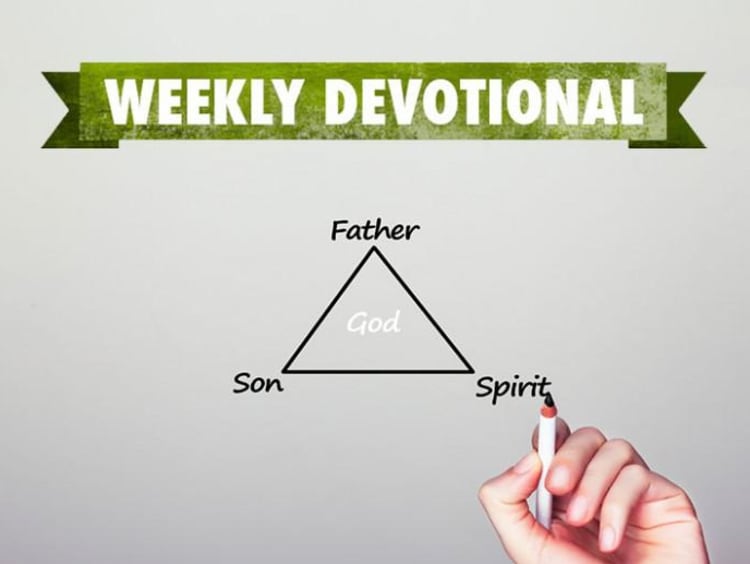Weekly Devotional: The Many Forms of God’s Love

For there are three that bear record in heaven, the Father, the Word and the Holy Ghost: and these three are one. (1 John 5:7)
While sitting in the teachers’ lounge of my old junior high school, I had a colleague tell me about a fascinating conversation she had just had with a student.
Even though we were in a public school setting, a student had brought up the topic of the Trinity and could not comprehend the concept.
Without missing a beat, the faculty member said that the Trinity is like the rapper Emenim. “Emenim” is the stage name for Marshall Mathers, who later developed an alter ego named “Slim Shady.”
While three separate names exist, with separate roles or personas, they represent one person. Completely satisfied with the answer, the student moved on with their day.
The analogy that I became familiar with as a child was a cherry pie. A cherry pie is one item; if it is cut into three even pieces, there would be three identical pieces, but not a whole pie.
Scripture references to separate beings are consistent. Most of the time I encounter people who do not struggle with the concept of the Trinity existing—they are attempting to rationalize or comprehend how three beings can indeed by one entity. Here on Earth, it simply doesn’t make sense.
I heard Chad Moore state during a Chapel service here at GCU that when it comes to the Trinity, it doesn’t come down to simple addition (1 + 1 + 1 = 3), but rather multiplication of (1 x 1 x 1 = 1).
Pastor Tim Griffin and College of Theology Dean Jason Hiles, PhD, recently sat down for Trending Faith to answer the question: “How can I understand the Trinity?”
The two talk through the initial intimidation and seemingly overwhelming aspects of the concept, then turn our attention to the nature of God desiring to connect with us and reveal himself in different ways in order to help us have an intimate and personal relationship with Him.
I also had a chance to catch up with Local Outreach Coordinator Chris Cunningham on his thoughts on the matter:
How can I understand the Trinity?
To be direct: I don’t know (thank you; this is what a master’s degree gets you).
Now let me clarify why I think “I don’t know” is a good enough answer.
Before that, a church history lesson. It’s speculated that the word “Trinity” wasn’t recorded in formalized language until around fourth century A.D. Before then, early church leaders like Ignatius hovered around the topic of the Trinity, encouraging early Christians to obey God, the Father, Son and the Holy Spirit, as though they were all equal.
So “Trinity,” like every other word in the human language, is a man-made device used to communicate an idea. Now I’m about to drop a bomb on you.
Ready?
Three.
Two.
One.
The word “Trinity” can’t be found anywhere in Scripture.
What about in the original languages? Nope.
The concept behind the word does exist in Scripture though.
In Matthew 28:19: “Therefore go and make disciples of all nations, baptizing them in the name of the Father and of the Son and of the Holy Spirit.”
In 1 Corinthians 8:6: “Yet for us there is but one God, the Father, from whom all things came and for whom we live; and there is but one Lord, Jesus Christ, through whom all things came and through whom we live.”
These words are great. I love ‘em! I think we should keep on using them!
But, when it comes to God, I think it’s important that we leave LOTS of room in our lives to be mystified by Him. Words have limits. God does not.
In recent years, scientists have come to a general consensus that the universe is about 96% dark matter.
Any guesses on what we know about dark matter?
We only have a basic understanding of about 4% of the known universe. What, then, does that say about an infinite God?
Human brains love certainty! It feels good to have that “Aha!” moment, doesn’t it?
But when it comes to God, it seems that the biblical authors and great spiritual leaders throughout history learned how to become content with an “Ahh” as opposed to an “Aha!”
These answers are not meant to curb your curiosity about God! Just the opposite. An infinite God presents limitless mystery, inviting everyone to explore and ask as many questions as your human brain can think up.
God’s infinite nature doesn’t stop at grace! You’ll get things wrong and misunderstand ideas, but I believe that God is wise, loving and patient enough to handle whatever we come up with.
As we go into a weekend of possibilities, I encourage you to consider Pastor Tim’s, Dean Hiles’ and Chris’ words about an infinite God and all of the possibilities there are to develop an everlasting relationship with Him.
While it is impossible in a lifetime to completely understand or unpack God’s character, my prayer and desire is that terms such as “Trinity” spark interest, as opposed to discouraging it. I hope that you will explore the Scripture and develop a deeper relationship with God to help you seek answers.
If you’d like to hear more about this topic, email your questions to Dr. Hiles and Pastor Tim at [email protected]. For more inspiration and answers to your questions about what’s written in the Bible, check out our previous Weekly Devotionals.
The views and opinions expressed in this article are those of the author’s and do not necessarily reflect the official policy or position of Grand Canyon University. Any sources cited were accurate as of the publish date.


